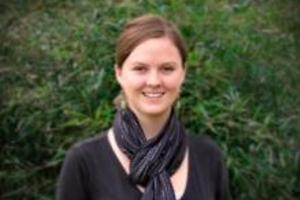
Tess Bone took a class in Notre Dame’s Gigot Center for Entrepreneurial Studies and made an unexpected discovery – she could combine her passion for peace and social justice with her newfound interest in business innovation.
“In my first years at Notre Dame, I never guessed I would take a class at the business school,” said Bone, a graduating senior who majored in sociology and peace studies. “But in peace studies, we learn to define peace as ‘the conditions for authentic human flourishing.’ In the MicroVenturing class, I started seeing new, nontraditional ways to create sustainable good for people and the environment.”
A competition finalist
When she saw a chance to contribute to a social venture plan for AGRASUN, a new energy company developing an environmentally sound bio-diesel product in Latin America, Bone jumped at it. The plan she developed with her teammates, Notre Dame MBA student Kennis Wooten and Notre Dame alumnus Michael Smedley, was a finalist in the Eighth Annual Social Venture Plan Competition sponsored by the Gigot Center at Notre Dame’s Mendoza College of Business. Joe Bock, director of external relations at the Kroc Institute, was an advisor to the team.
AGRASUN is a privately held company in Florida that is committed to ecologically sound, economically sustainable, and socially responsible production of bio-diesel. The company has entered into negotiations with the Mexican and Colombian governments in order to grow the jatropha berry, whose seeds, when crushed and refined, produce a clean-burning alternative to petroleum. In Colombia, the plant grows naturally in a region inhabited by a large community of people displaced by violence and drug trafficking.
The social venture plan developed by Bone, Wooten, and Smedley is driven by concern for a “triple bottom line,” Bone said: people, planet, and profits. To develop the plan, the team traveled to Colombia to meet the company’s scientific partners, attend an international microfinance and peacebuilding conference, and develop local contacts among nongovernment organizations with whom they might collaborate on health, education, sanitation, housing, and other community initiatives.
The next big thing
When describing the project, Bone can barely contain her excitement. “We think jatropha is going to be the next big thing in biodiesel,” she said. “It beats ethanol, sugar cane, and corn in cost and performance. It improves the soil when it’s planted. The fuel emits almost no greenhouse gases, and the trees can capture four tons of carbon dioxide per acre. It takes almost no machinery to harvest, so it will create thousands of jobs for local people and an alternative crop to narcotics and the illicit drug trade.
“The social benefit is what really attracted me to this project,” she said. “So many people are displaced by the conflict in Colombia, and they are languishing with no work or food for their families. This situation creates the conditions for even more violence to emerge. It’s really incredible knowing how much potential this kind of social venture project has for good.”
Bone will spend the summer in Ecuador on an internship arranged by the Gigot Center. After that, she hopes to begin a career in social venturing.
Contact: Tess Bone, theresa.m.bone.5@nd.edu